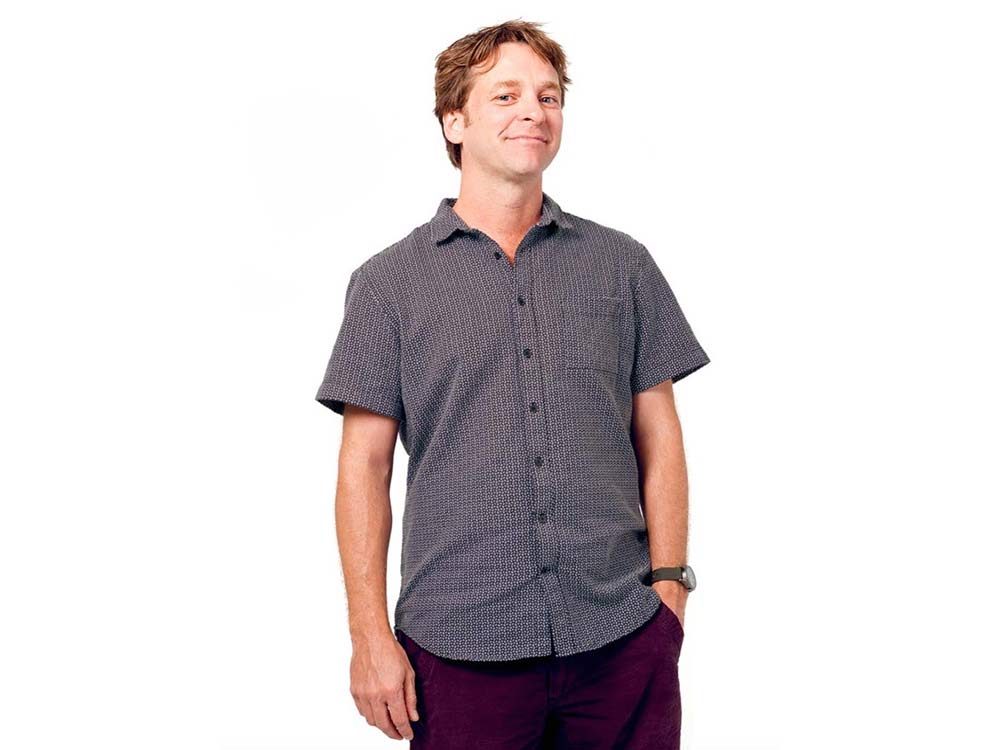This Montreal Optician Is Providing Affordable Eye Care to Those In Need
Optician Philippe Rochette, a.k.a. Bonhomme à lunettes, believes everyone has a right to see clearly—no matter their means.

Great Canadians: Bonhomme à lunettes
In the low-ceilinged lobby of YMCA Guy-Favreau in downtown Montreal, two women are trying on eyeglasses. One holds up a square mirror, tilts her face from side to side, then shakes her head: not quite right. She moves on to the frames her neighbour has just put down.
Optician Philippe Rochette, better known by his alias, Bonhomme à lunettes, triages the crowd. Who’s here to pick up glasses? Who’s here for repairs? To find a new pair? Switching between French and English, with a bit of Spanish thrown in, the gregarious 42-year-old negotiates a deposit with a senior whose glasses have been stolen—how much can he afford?—and reassures a waiting woman that she hasn’t been forgotten.
Rochette fell into a career as an optician by accident, he says—he needed to support himself while studying creative writing and cinema at the Université du Quebec à Montréal. After completing an optical training program and spending several years selling high-end designer frames—“Plated gold, 23.6 karat; I did all of that”—Rochette was fed up with how the cost of glasses was tied less to function and more to fashion.
In 2007, while volunteering at a fundraising drive at an east-end YMCA, he had an idea: affordable eye care for all—or at least as many people as possible. He purchased the bare necessities, like tools and frames, and with the blessing of the Y, set up in their lobby. His goal was to offer fair prices (frames from $20 and up for people on social assistance with coverage, for example) by purchasing discontinued or out-of-season stock from warehouses, as well as non-branded frames. He would then give a portion from each sale back to the community in the form of donations.
From that one YMCA, Rochette’s business has grown exponentially. What began as a part-time endeavour is now a 21-employee outfit that serves 48 different locations in the greater Montreal area every week. Rochette has raised approximately $325,000 for community organizations (including Camp LIFT, which runs outdoor programs for at-risk youth) and political causes (the Occupy movement). He estimates that he’s sold a total of 50,000 pairs of glasses so far.
For his customers, Rochette’s business model makes a big difference. Twentysomething Ouiam Didane is at Guy-Favreau to buy her first pair of glasses. For her, it’s important to see well—but she still wants glasses that suit her. “It’s the first thing you see on yourself, and that others see too,” she says, trying on a model with wire frames. “It’s how you present yourself.”
France Jean, a 63-year-old administrative assistant without health benefits but with high-degree myopia, requires a very strong prescription. At a bricks-and-mortar shop, she’d likely pay at least $1,200 for a single pair of glasses; with Bonhomme à lunettes, she gets two pairs (one for distance and one for reading) for $500. Though Rochette’s clients may pay slightly more with him than through an online service, Rochette is better equipped to handle complex cases and can do frame fittings. Moreover, his clients receive the satisfaction of giving back to their community. Jean is impressed with the work Rochette is doing: “There need to be more people like him.”
A decade after founding Bonhomme à lunettes, Rochette is expanding his enterprise. He has joined forces with fellow health professionals and started a collective, Portes Orange, to offer acupuncture, psychotherapy, massage, counselling and other services at affordable rates in Montreal’s Mile End neighbourhood.
Rochette has also trained opticians from Vancouver, Toronto, Saguenay–Lac-St-Jean, Sherbrooke and even Wisconsin on how to adopt his model. The trick, he says, is to stick to simple. “If you keep your fixed
expenses as low as possible from the start, you get closer and closer to the real worth of a frame,” Rochette says. “Being able to see is not a luxury. It’s a matter of public health.”



